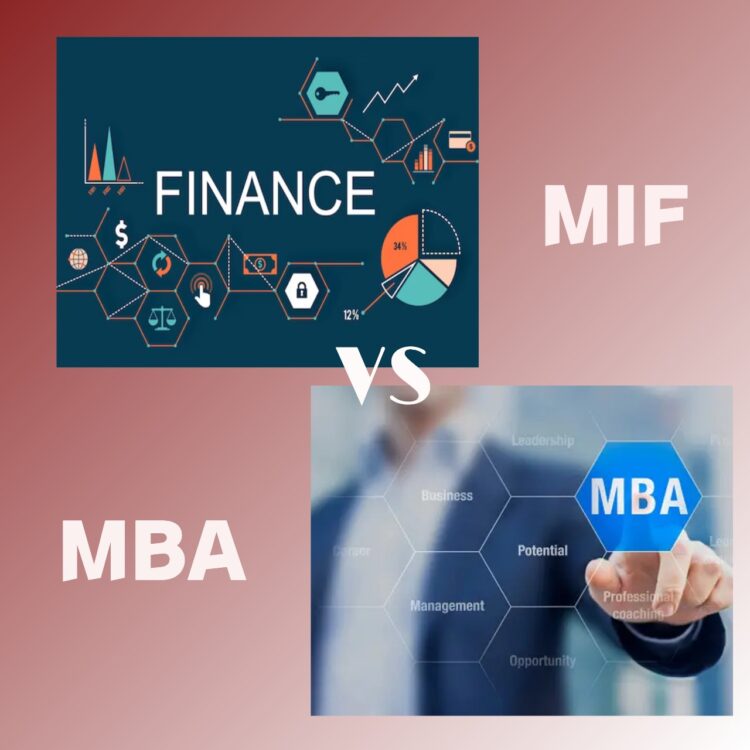Looking to grow your career but confused with what program to choose? If so, you might opt for an MBA or MIF program. But which degree will enable the professional growth chances you envision? And exactly how do the MBA and MIF courses differ from one another? To assist you in making the best decision, we’ll highlight the key differences between the two in this blog.
Core Distinction
People who want to work in the financial markets, whether in venture capital, private equity, investment banking, or asset management, should consider doing a Master’s in Finance program.

A Master’s in Management, on the other hand, is regarded as a general management degree that covers finance in addition to a wide range of essential business management tasks, such as marketing and strategy.
Work Experience
For MIF programs, the general rule is that you can enroll even if you do not have any prior work experience. This means you can jump right into the program after completing your undergraduate studies.

Conversely, MBA programs typically have a stricter requirement. They usually ask for candidates to have a certain amount of work experience before applying. This requirement can vary between two to five years depending on the school. The purpose of this requirement is to showcase your leadership potential and your ability to contribute effectively in a business and managerial context.
However, it’s worth noting that not all schools adhere strictly to this work experience requirement. Some MBA programs might consider candidates with limited work history or even those who have none at all.
Course Curriculum
A Master in Finance and a Master of Business Administration are both graduate-level programs but have distinct course curriculum tailored to different career goals.
MIF programs primarily concentrate on finance-related topics. Most of their topics include investment analysis, financial markets, risk management, and corporate finance. Core courses often include financial management, financial modeling, quantitative methods, and economics. Students can choose from a range of electives like derivatives, portfolio management, and international finance. MIF programs may also offer specializations in areas like investment banking, asset management, or financial analytics. An MIF program is typically a one-year program.

MBA programs provide a broader business education covering areas like finance, marketing, operations, strategy, and leadership. Core courses usually encompass management fundamentals, accounting, marketing, and strategy. MBA students can tailor their education through electives, which may include finance-related courses. Many MBA programs offer concentrations, including finance, for those interested in deeper financial knowledge. An MBA program is typically a two-year program, although there are part-time options.
Career Goals and Aspirations
A Master in Finance and a Master of Business Administration differ significantly in terms of career goals and aspirations.
MIF programs are specialized degrees that concentrate primarily on finance-related subjects. These programs delve deep into areas, such as investment management, financial analysis, risk assessment, and corporate finance.
Individuals pursuing an MIF often aspire to enter finance-specific roles. This includes careers in investment banking, asset management, hedge funds, private equity, and corporate finance. The program equips students with the quantitative and analytical skills needed to excel in these competitive fields.

Graduates of MIF programs typically find opportunities in financial institutions, including banks, insurance companies, and investment firms. They may also work for corporations in roles related to financial strategy and analysis.
MBA programs, on the other hand, offer a broad and comprehensive education in business management. They cover a wide range of subjects, including finance, marketing, operations, strategy, leadership, and entrepreneurship.
MBA graduates often aim for leadership and management positions. They seek to develop a well-rounded skill set that enables them to navigate various aspects of business, making them suitable for roles like general management, consulting, entrepreneurship, and leadership in diverse industries.
MBA graduates can work in virtually any industry, including finance, healthcare, technology, and consumer goods. They may pursue careers in consulting firms, multinational corporations, startups, or even venture into entrepreneurship.
Admission Requirements and Criteria
MIF programs typically require a strong academic background in finance, economics, or a related field. Applicants often need a bachelor’s degree with relevant coursework, and some programs may specify a minimum GPA. While some MIF programs accept students directly after their undergraduate studies, many prefer candidates with some prior work experience, usually ranging from 0 to 3 years. This experience can enhance the applicant’s profile.
Many MIF programs require standardized test scores, such as the GMAT (Graduate Management Admission Test) or GRE (Graduate Record Examination). High scores in quantitative sections are often favored. Applicants typically need to submit letters of recommendation, often from academic professors or employers who can attest to their qualifications and potential.
A well-crafted statement of purpose outlining career goals and reasons for pursuing the MIF is usually required. This is a crucial component of the application. Some MIF programs may conduct interviews to assess a candidate’s suitability for the program. These interviews may focus on both academic and personal aspects. International applicants may need to demonstrate proficiency in the language of instruction, usually English, through tests like TOEFL or IELTS.

MBA programs, on the other hand, typically require applicants to hold a bachelor’s degree from an accredited institution. While a specific major is not always required, some programs prefer candidates with prior business-related coursework. Most MBA programs prefer applicants with several years of professional work experience. The average range is often between 2 to 5 years. This experience helps create a diverse and experienced cohort.
While not all MBA programs require standardized test scores, many accept the GMAT or GRE. However, some programs have started to waive these requirements, particularly for applicants with substantial work experience. MBA applicants are generally expected to submit letters of recommendation, often from supervisors or colleagues who can provide insights into their leadership potential.
MBA applications usually require essays or a statement of purpose that highlights the applicant’s career goals, leadership experiences, and reasons for pursuing an MBA. Many MBA programs conduct interviews as part of the selection process, often after an initial review of the application. Interviews assess interpersonal skills, leadership potential, and fit with the program. For international applicants, proof of English language proficiency through TOEFL or IELTS is typically required.
Cost and Financial Considerations
Tuition fees for MIF programs can vary widely depending on the institution, location, and program duration. On average, MIF programs tend to be shorter in duration than MBAs, which can lead to lower tuition costs. MIF programs may offer scholarships and financial aid options, but they might be more limited compared to MBA programs. Scholarships may be based on academic merit, diversity, or financial need.
MIF graduates, especially those pursuing careers in finance, often have the potential for high earning potential. This can help justify the investment in their education over time. Consider the cost of living in the location of the MIF program, as it can vary significantly. If you enter an MIF program immediately after your undergraduate studies, consider the opportunity cost of not working during that time. However, the shorter duration of MIF programs may mitigate this cost compared to longer MBA programs.

MBA programs are known for their higher tuition costs compared to MIF programs. The duration of most full-time MBA programs is typically longer, which contributes to the higher overall expenses. MBA programs often have more extensive scholarship and financial aid options. These can include merit-based scholarships, need-based grants, and assistantships. Many schools also offer opportunities for fellowships and loans.
MBA graduates can also command high salaries, but the ROI may vary depending on factors, such as the school’s reputation, the industry, and the level of experience before entering the program. Like MIF programs, the cost of living in the location of the MBA program plays a significant role in overall expenses. Urban areas, especially in prestigious MBA program locations, tend to have higher living costs. MBA applicants often have several years of work experience, and the opportunity cost of leaving a well-paying job for an MBA program can be substantial. However, the potential long-term benefits can outweigh this cost.
Job Placement and Salary Potential
MIF graduates often find job placement in finance-specific roles. These may include positions in investment banking, asset management, hedge funds, private equity, and corporate finance. The specialized knowledge and skills acquired in MIF programs make graduates highly competitive for these roles.
The salary potential for MIF graduates can be quite lucrative. In finance-related fields, compensation often includes substantial bonuses and performance-based incentives. Entry-level salaries can vary but are generally higher than many other industries, and they tend to increase significantly with experience and performance. MIF programs are designed to prepare students for roles in the financial industry. Therefore, the salary potential is closely tied to this sector’s dynamics, including market conditions and demand for financial professionals.

MBA graduates have a broader range of job placement opportunities across various industries and sectors. They can pursue roles in general management, consulting, marketing, entrepreneurship, operations, and more. The diverse skill set acquired during an MBA program opens doors to leadership positions in diverse fields.
MBA graduates also have the potential for high salaries, but it can vary widely depending on factors, such as industry, location, and prior experience. Leadership roles in established companies or successful startups often come with competitive compensation packages, including bonuses and equity. The salary potential for MBA graduates is influenced by the diversity of industries they can enter. While finance and consulting remain popular choices, MBAs can excel in technology, healthcare, consumer goods, and many other sectors.
Conclusion
Your job ambitions should be taken into account when deciding between a Master’s in Finance and a Master’s in Business Administration. An MIF provides specialized expertise in finance, concentrating on subjects like financial analysis, risk management, and investing. It is perfect for people who want to work in finance in positions like investment banking or financial analysis.
A broader business education, on the other hand, is offered by an MBA and covers topics like marketing, management, operations, and entrepreneurship. It is appropriate for those looking for flexible leadership roles in business or beginning their own businesses.
Your career goals will ultimately determine which degree you should pursue: an MBA for a broader business skill set or a MIF for finance-focused employment. To make an informed decision, take into account your long-term objectives, personal interests, and the sector you wish to work in.





